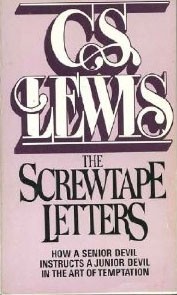Devilishly Clever
The Screwtape Letters. Most of us have read it at one time or another. I reread it this week with my daughters and was struck again by its often disturbing relevance and genius. On the surface, it seems like a good joke: a senior devil’s tutorials as addressed to his younger nephew, an inexperienced tempter. But I can see why Lewis himself spoke of both the ease of its inspiration , and the unpleasantness of its writing. “It almost smothered me before I was done,” he writes in the preface. “It would have smothered my readers had I prolonged it.”
 Yes. But he kept it at the right length. And though not all the chapters were relatable for my daughters (some are aimed exclusively at men), Screwtape’s articulateness in describing the many layers of human folly can’t help but raise our awareness of our own inner lives. We read some of the book aloud, and listened to some via audiobook. (If you are interested in a good reader, the reading we listened to was absolutely perfect. Follow the link to hear a sample.)
Yes. But he kept it at the right length. And though not all the chapters were relatable for my daughters (some are aimed exclusively at men), Screwtape’s articulateness in describing the many layers of human folly can’t help but raise our awareness of our own inner lives. We read some of the book aloud, and listened to some via audiobook. (If you are interested in a good reader, the reading we listened to was absolutely perfect. Follow the link to hear a sample.)
One way the darkness of the letters made an impression on us was in the diabolical relationship between Screwtape and his nephew, Wormwood. “Your affectionate uncle Screwtape,” the writer’s sign-off in every chapter, has a very different meaning for the inhabitants of hell than for those still under the influence of God’s goodness in the world, and the contrast is at times quite chilling. Even the scene in which Screwtape involuntarily turns into a giant centipede in his rage over Wormwood’s failure to prevent his subject’s relationship with a vibrant Christian woman, though comical in its way, is also quite sinister.
In “Screwtape Proposes a Toast,” the concluding section, Lewis offers a discussion of democracy from a demon’s perspective. Screwtape remarks that the fight for Liberty has at the heart “a deep hatred of personal freedom,” pointing to tendencies even in democratic institutions that have been highlighted by authors such as Orwell, Huxley and Vonnegut. The “Toast” was written in 1960 and is eerily on target as a criticism of present-day American society. It focuses on the outcomes of the “I’m as good as you” line of thinking, mainly the forced leveling of human gifts and abilities through political power. Much of this, Screwtape suggests, happens through the educational system. “We shall no longer have to plan and toil to spread imperturbable conceit and incurable ignorance among men,” Screwtape assures the audience at the Tempers’ Training College of young devils. “The little vermin will do it for us.” Interestingly, this is done through making all education public, and making it unthinkable for anyone to send their children to private schools. I couldn’t help but think of the great opposition recently to Ms. DeVos, who favors school choice.
From how to exploit household annoyances, to ways to corrupt sexual impulses and romantic ideas, to uses of church in killing one’s genuine faith, to gluttony in its various forms, Screwtape shines a bright light on the strategems of hell in wooing a human soul away from the good. The best road, he points out, is the gradual one — “the gentle slope, soft underfoot, without sudden turnings, without milestones, without signposts.” By publishing these missives, he has done his cause some serious harm.



2 Comments
Barbara H.
I’ve only read this once, and that was in the last couple of years. I don’t know how I missed it for so long, but it is one I probably will read again at intervals.
Pingback: